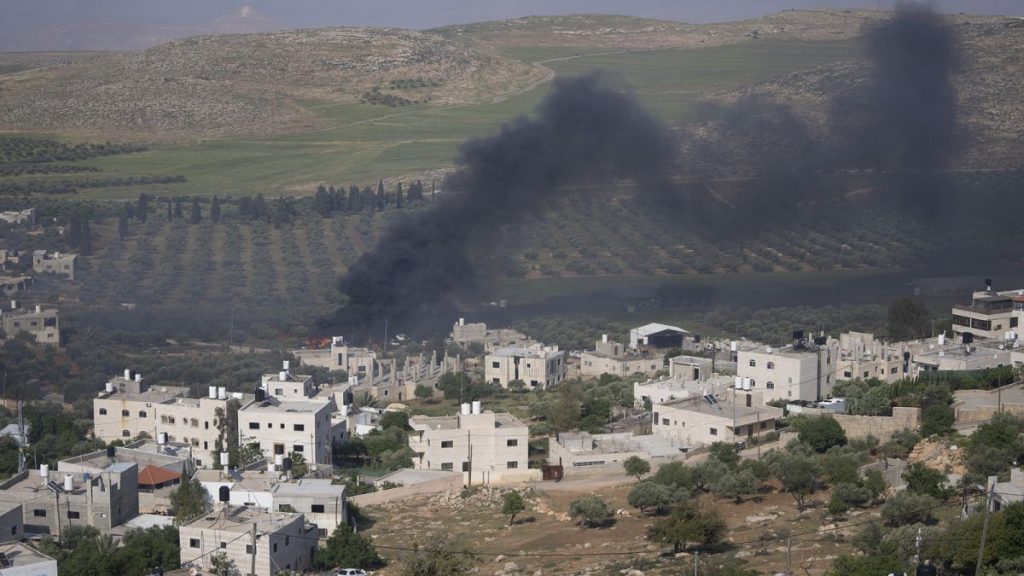The European Union has taken steps to sanction Israeli settlers responsible for attacks on Palestinian communities in the West Bank and East Jerusalem, with 490,000 Israelis living in settlements in the Israeli-occupied West Bank. Attacks on Palestinians in the region have increased since the outbreak of a war between Israel and Hamas, leading to around 460 deaths. The EU has agreed to blacklist four individuals and two entities under its human rights sanctions regime, meaning they will be banned from travelling to the bloc and their financial assets frozen. The move comes amid escalating violence in the West Bank, with tensions deepening following the killing of a 14-year-old boy from a settler family. NGO Human Rights Watch has accused Israeli settlers of displacing Palestinian communities by destroying homes and perpetrating acts of assault and torture.
The EU’s high representative for foreign policy, Josep Borrell, has highlighted settler violence as a major obstacle to future peace in the region, as settlers are opposed to the two-state solution that would grant statehood to Palestinians. The EU has criticized Benjamin Netanyahu’s government for supporting projects that aim to expand settlements in the West Bank and around Jerusalem, and has called for such decisions to be reversed. The formal approval of sanctions against Israeli settlers comes as the EU navigates a delicate stance on the Middle East conflict amidst escalating tensions between Israel and Iran. Following an aerial attack on Israeli territory by Iran, EU leaders have expressed solidarity with Israel while urging Netanyahu’s cabinet to exercise restraint. Some EU countries, such as Spain and Ireland, have called for a review of the bloc’s trade deal with Israel – the Association Agreement – in order to pressure the Israeli government to show restraint in its Gaza offensive.
The implementation of EU sanctions on Israeli settlers has been delayed due to technical work, prompting some countries like France and Belgium to unilaterally impose national sanctions. The targeted entities include Lehava, a far-right Jewish supremacist organization, and Hilltop Youth, whose activities have been halted by the Israeli Defense Forces for multiple incidents of violence and abuses against Palestinian civilians. Leading figures of Hilltop Youth, Meir Ettinger and Elisha Yered, are also on the sanctions list. Amidst these developments, there have been calls for the EU to toughen its stance on Netanyahu’s government, with some capitals advocating for a review of the EU-Israel Association Agreement and the enforcement of labeling rules on Israeli products made by settlers. The EU has emphasized the importance of enforcing existing legislation and bilateral arrangements applicable to settlements products, which include clear labelling and less preferential customs arrangements for goods from Israeli settlers.
The EU’s decision to sanction Israeli settlers comes after a political agreement was reached among the bloc’s 27 member countries, but technical work delayed its implementation. The sanctions target individuals and entities responsible for settler violence in the West Bank, with Lehava and Hilltop Youth among those blacklisted. The move has been met with calls from some EU countries to review the bloc’s trade deal with Israel and to enforce rules on labeling products made by settlers. The EU has expressed concern over settler violence as a major obstacle to peace in the region, as settlers oppose the two-state solution that would grant statehood to Palestinians. The bloc has also criticized Netanyahu’s government for supporting projects aimed at expanding settlements in the West Bank and around Jerusalem. Amidst escalating tensions between Israel and Iran, the EU has reiterated its solidarity with Israel while urging restraint from Netanyahu’s cabinet.
The EU’s decision to sanction Israeli settlers responsible for attacks on Palestinian communities in the West Bank and East Jerusalem is a response to escalating violence in the region, with around 460 deaths reported since the outbreak of conflict between Israel and Hamas. The sanctions target individuals and entities involved in settler violence, such as Lehava and Hilltop Youth, with four individuals and two entities being blacklisted under the EU’s human rights sanctions regime. The move has been delayed due to technical work, prompting some countries to unilaterally impose national sanctions. There have been calls for the EU to strengthen its stance on Netanyahu’s government, with some EU countries advocating for a review of the trade deal with Israel and the enforcement of labeling rules on products made by Israeli settlers. As tensions in the region continue to deepen, the EU is carefully calibrating its stance on the Middle East conflict amidst heightened tensions between Israel and Iran.
The EU’s decision to impose sanctions on Israeli settlers follows a political agreement reached among the bloc’s 27 member countries, highlighting the bloc’s concern over settler violence as a major obstacle to peace in the region. The move comes amid escalating violence in the West Bank, with tensions deepening following the killing of a 14-year-old boy from a settler family. The EU has criticized Netanyahu’s government for supporting projects aimed at expanding settlements in the West Bank and around Jerusalem, calling for such decisions to be reversed. Amidst escalating tensions between Israel and Iran, the EU has expressed solidarity with Israel while urging restraint from Netanyahu’s cabinet. Some EU countries have called for a review of the trade deal with Israel and stricter enforcement of labeling rules on products made by Israeli settlers. The bloc has emphasized the need to enforce existing legislation and bilateral arrangements applicable to settlements products, underscoring the importance of addressing settler violence as a key obstacle to future peace in the region.


